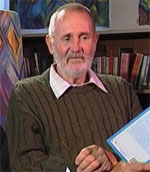This Day in History: December 23, 2002
Additional Date: December 23, 2002
Tatamkhulu Africa was born in As Sallum in Egypt as Mohamed Faud Nasif to an Arab father and a Turkish mother on 7 December 1920. His parents relocated to South Africa in 1923 where they died from the Asia flu leaving him orphaned at the age of two. He was then taken care of by friends and family before being given to a Methodist couple who renamed him John Charlton. After leaving school in 1938, his adoptive parents informed him that he was their adopted son and he was not white. At the age of 17, John Charlton completed and published his novel Broken Earth which was published in England in 1940. Almost the entire print was destroyed by a bomb in London during the World War II. During World War II, Charlton volunteered for the South African army and was captured at Tobruk and spent time as a prisoner of war. After the end of the war, he went to live in Namibia where he was taken in by an Afrikaans family. It was here that he obtained his third name Jouza Joubert working as a copper miner, a barman, a shop assistant, an auditors' clerk and as a jazz drummer. In 1964, Jouza Joubert embraced Islam and changed his name to Ismail Joubert before settling in District Six. When District Six was destroyed in 1967, Joubert launched a militant Muslim organisation known as Al Jihaad. Al Jihaad not only opposed apartheid, but it was also a welfare organisation. Ismail Joubert and other members of Al Jihaad joined uMkhonto weSizwe (MK) the armed wing of the African National Congress (ANC) in the early 1980s. As a result of political activities, Joubert was arrested and charged with Terrorism in 1987 and spent some time in prison. He was then banned for five years and forbidden to write. During his time in MK he was given the name Tatamkhulu Afrika (Grandfather Africa), a name that he adopted as his official name. Tatamkhulu Afrika then used his new name to write while he was in contravention of his banning orders. Tatamkhulu Afrika published eight volumes of poetry and four prose works since 1990. He won prizes for poetry which included among others the CNA Debut Prize, Pringle Awards, the Olive Schreiner and Sanlam Poetry Prizes. He donated a large portion of his income to establish an Islamic centre in Guguletu and to run a creche. On 23 December 2002, Tatamkhulu Afrika died of complications after being knocked over by a car in a road accident.
